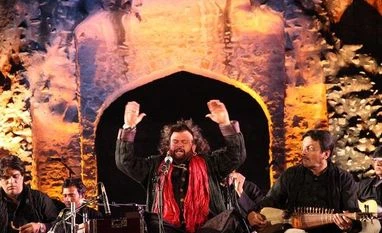In the corridors of power of the Delhi Sultanate in the 13th century, Amir Khusrau transcended the barriers of language, culture and religion to become a timeless icon. His verses have since passed from one generation to the next and empowered myriad emotions with the art of expression. The commemoration of his death, thus, is a celebration of his life — and all life. As dusk falls on Humayun’s Tomb in Delhi next week, not far from Khusrau’s resting place, his mysticism will come alive again through the power of music.
Jahan-e-Khusrau, or the World Sufi Music Festival, is that juncture where traditions meet and flow into a single stream of Sufism. For 13 years, since it was first held in 2001, filmmaker and revivalist Muzaffar Ali has been leafing through the odes, old and new, and bringing together some of the most powerful musical artistes.
Recreating the magic of Sufism each year that enables one to surrender to a higher power is a challenge that is met with years of experience and limitless passion.
“Every year, we dig out new poetry and find new artistes to produce and perform it,” says Ali. He says the more established ones always want to come back. “Sometimes I don’t know how to say no.”
Ali honours Khusrau for being a blender of cultures, languages and different forms of music. Khusrau wrote in Persian and in Hindavi, and mixed the two into Urdu. He is widely regarded as the founder of qawwali. His poem, “Zehaal-e-Miskeen”, which has been adapted by the likes of Gulzar and performed by the Sabri Brothers as well as Lata Mangeshkar, flows from Persian into Braj bhasha.
The lineup of the three-day festival includes performances by Shubha Mudgal, Hans Raj Hans, Kailash Kher, Malini Awasthi and first-timer Pooja Gaitonde, along with the World Ethnic Music Ensemble. The festival has the reputation of bringing together ruhani (soulful) musicians from around the world.
Ali has also directed a two-part ballet, Yamuna: Ek Darya Prem Ka, which visualises the influence of the river in Khusrau’s life and ours, and how it speaks of the “timelessness of the human soul”. The mission is a call to action to save the dying river.
Awasthi will bring together Awadhi and Bhojpuri as well as folk traditions in Khusrau’s words. “It’s a divine experience. Sufi is not a form of singing but a mental state of self-discovery. Such festivals educate, sensitise and make people experience the meaning of Sufism,” says Awasthi. She will also perform a qawwali this year.
Mudgal, who has been associated with the festival for years, says Ali’s sense of artistry and design at the archeological spectacle of Humayun’s Tomb makes for a wonderful ambience. “In the Sufi silsila, the texts are often in Urdu and Farsi (Persian), which Ali picks for every artiste. It’s a new and enriching experience for both artistes and audience,” she says. It’s a source of joy for Mudgal to see younger people experiencing Sufi music at such festivals and falling in love with it.
Kher, along with his band, Kailasa, has been waiting to perform at the festival for years, but the logistics did not match up until this year. He says he recognises a passionate and learned audience when he sees one, and that, he says, elevates his performance. “You don’t always like the songs that you sing, especially in Bollywood.
Like singers, even listeners have an ear for good music. And when you find such an audience, you go all out,” says Kher.
Ali is known to hunt out new talent and Gaitonde, who is from Mumbai, believes he zeroed in on her through her music on YouTube. Sufi music has been a part of Gaitonde’s life since she started learning classical music as a child and she does not think there’s a need for revival. “Khusrau is recited around the world. And it’s amazing to see how the farmaish (request) from younger crowds these days is sufiana music over mainstream Bollywood numbers,” says Gaitonde.
As Kher puts it, “You find what you seek.” And festivals such as these only lend a stage to the seekers.
‘Jahan-e-Khusrau’ will be held at Arab ki Sarai, Humayun’s Tomb in New Delhi from March 9 to March 11
Unlock 30+ premium stories daily hand-picked by our editors, across devices on browser and app.
Pick your 5 favourite companies, get a daily email with all news updates on them.
Full access to our intuitive epaper - clip, save, share articles from any device; newspaper archives from 2006.
Preferential invites to Business Standard events.
Curated newsletters on markets, personal finance, policy & politics, start-ups, technology, and more.
)